On Saturday, China initiated two investigations aimed at the U.S. semiconductor industry in advance of important talks in Spain scheduled for this week. The discussions, involving U.S. Treasury Secretary Scott Bessent and Chinese Vice Premier He Lifeng, will touch on trade issues, national security concerns, and the ownership of the social media platform TikTok.
China's Ministry of Commerce has announced an anti-dumping investigation focusing on specific analog integrated circuit (IC) chips imported from the United States. This investigation will concentrate on certain commodity interface IC chips and gate driver IC chips, which are primarily manufactured by major U.S. companies such as Texas Instruments and ON Semiconductor. In addition to this, the ministry has also revealed a separate anti-discrimination probe that will examine U.S. measures that impact China's semiconductor sector.
The backdrop of these investigations is a broader context in which the United States recently added 23 Chinese companies to an "entity list," which subjects these businesses to restrictions for allegedly undermining U.S. national security and foreign policy interests. Notably, this list includes two companies accused of acquiring chipmaking equipment on behalf of China's major chip manufacturer, SMIC.
The upcoming meetings between Bessent and He in Madrid are set to continue a series of ongoing negotiations aimed at alleviating trade tensions and delaying newer, higher tariffs on each other's goods. Previous discussions took place in Geneva in May, London in June, and Stockholm in July, resulting in several 90-day pauses on reciprocal tariff increases. Such negotiations have, thus far, helped to avoid a full-blown trade war between the two nations.
Bessent characterized the discussions during the last round in Stockholm as "very fulsome," emphasizing the need to "de-risk" certain strategic industries, including rare earths, semiconductors, and medicines. He highlighted the importance of finding a balance in U.S.-China relations during these deliberations.
Both former President Donald Trump and current President Joe Biden have implemented measures to restrict China's access to advanced semiconductors, including limitations on the sale of chipmaking equipment. While Washington cites national security ramifications for these actions, China contends that such restrictions are part of a U.S. strategy aimed at containing its economic growth and technological advancement.
As the negotiations unfold in Spain, the focus will be on navigating the complex landscape of U.S.-China relations, particularly in the critical semiconductor sector.











